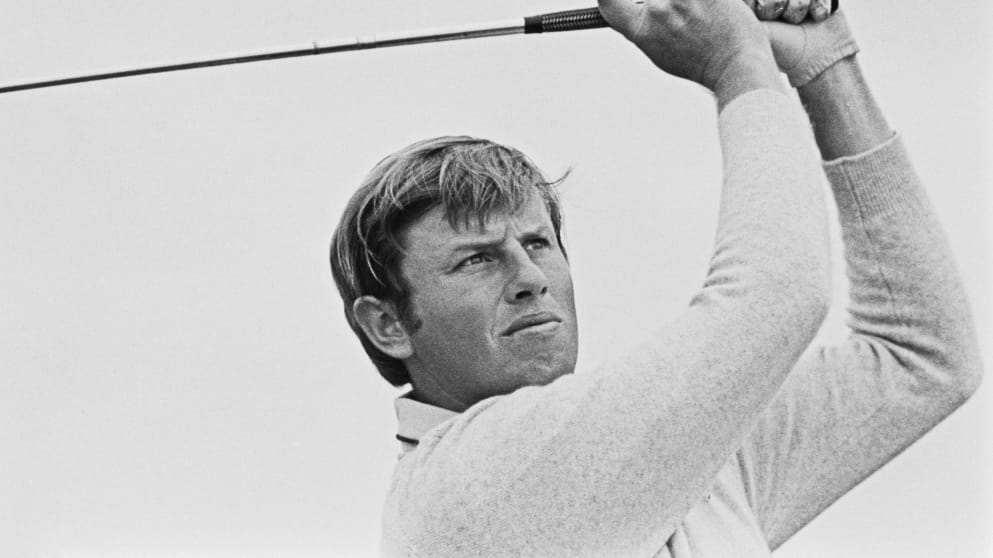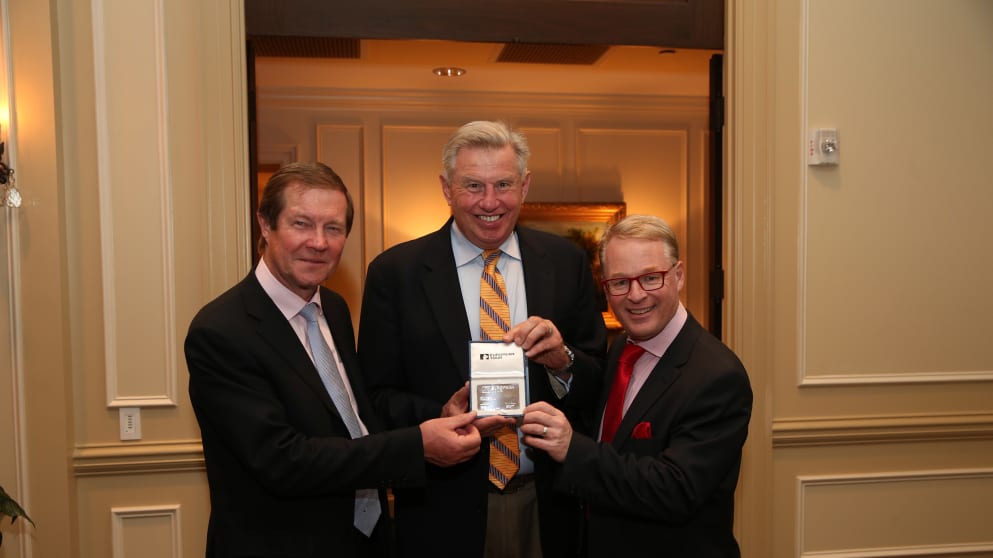Peter Oosterhuis, a four-time Harry Vardon Trophy winner and six-time Ryder Cup player, has passed away at the age of 75.

The Englishman was the dominant force in European golf during the European Tour’s formative years, winning the Order of Merit in the Tour’s first three seasons from 1972 to 1974, having also being crowned European Number One in 1971. He also topped the Sunshine Tour’s Money List in 1970 and 1971.
In total he won 20 times around the world, finished runner up in both the 1974 and 1982 Open Championships and won six out of his eight singles matches in the Ryder Cup during a celebrated playing career before going on to become a hugely accomplished broadcaster.
Born in London on May 3, 1948, Oosterhuis took up golf at Dulwich and Sydenham Golf Club in London. He enjoyed a prolific amateur career, representing England and Great Britain & Ireland on numerous occasions. He made his senior debut at the Home Internationals in 1966 and represented GB&I at the 1967 Walker Cup.
He turned professional in 1968 and won the Sir Henry Cotton Rookie of the Year Award the following year. He made his PGA TOUR debut in 1971 and also made his first Masters Tournament appearance that year.
A first European circuit title followed soon after, winning the Agfa-Gevaert Tournament, as well as the Sunbeam Electric Tournament and Piccadilly Medal as he beat former European Tour Chairman Neil Coles to the Order of Merit title by just seven points.
Oosterhuis made the first of six Ryder Cup appearances in 1971, returning three points from six matches on his debut, including a 3&2 singles victory over Arnold Palmer.
In 1972, the European Tour’s first year, Oosterhuis recorded one win, beating Christy O’Connor Jnr in a play-off at the Penfold-Bournemouth Tournament, and three runner-up finishes as he won the Harry Vardon Trophy for a second consecutive season.
The following season he won three times, claiming the Piccadilly Medal and the French Open before winning the Viyella PGA Championship – now known as the BMW PGA Championship – at Wentworth Club. He also finished third in the Masters Tournament at Augusta National.
In 1974 he finished runner-up to Gary Player at The Open Championship at Royal Lytham & St Annes and, like the previous season, he won three times on the European Tour, defending his French Open title and the finishing the season by winning in consecutive weeks in the Italian Open and the El Parasio Open in Spain.
That took his total European Tour victories to seven and also ensure he finished European Number One again with his record of four consecutive Order of Merit victories only bettered by Colin Montgomerie’s seven successive wins from 1993-97.
He made his final Ryder Cup appearance in 1981, and although he never featured on a winning team during a period of American dominance, he finished with an individual record of 15.5 points from his 28 matches.
The same year he claimed his sole PGA TOUR victory, as he won the Canadian Open at Glen Abbey, and in 1982 he finished runner-up in the Open Championship for a second time, on this occasion to Tom Watson at Royal Troon.
After calling time on his playing career after the 1986 season, he became the club professional at Forsgate Country Club, New Jersey. Six years later he became Director of Golf at Riviera Country Club in California, which has hosted the PGA TOUR’s Genesis Invitational almost every year since 1973.
In 1993, Oosterhuis returned to England and he was given the opportunity by Sky TV to commentate on the PGA Championship at Inverness. This was the start of a second career for the Englishman as he went on to become a renowned broadcaster in the United States, with he and Renton Laidlaw bringing the European Tour to life through the newly-established Golf Channel.
He joined CBS Sports full-time in 1998 and became one of the game’s most respected analysts.
In 2016, he was awarded Honorary Life Membership of the European Tour, the year after he announced he had been diagnosed with early-onset Alzheimer’s disease.

Guy Kinnings, DP World Tour Chief Executive, said: “On behalf of everyone at the European Tour Group and Ryder Cup Europe, we are deeply saddened to learn of Peter’s passing.
“Peter was hugely admired and respected by all of us who were fortunate enough to have spent time in his company, and indeed by everyone who followed his career.
“He leaves an indelible legacy in our sport, both as a distinguished player and as wonderfully eloquent broadcaster. He made such an immeasurable contribution to our Tour, especially during the Tour’s formative years in the 1970s when he was such a dominant force and through his six Ryder Cup appearances.
“Our thoughts are with his family and friends, and as a Tour we will continue to honour and remember his remarkable career.”
Eric Nicoli, Chairman of the European Tour Group, said: “Peter was a giant of a man in all respects. A world class player and broadcaster who graced our sport on both sides of the Atlantic.
“Thoughtful, gracious, honest, polite yet intensely competitive - he epitomised the values of golf that we must all strive to maintain. He will be greatly missed.”
David Williams, former Chairman of the European Tour Group and a fellow member at the Dulwich and Sydenham Golf Club, said: “As I walk the fairways of our Club, there is rarely a time when I don’t think of Peter playing on this course where he grew up and perfected his extraordinary game.
“A legacy will be the inspiration his life and career will give to a new generation of Dulwich golfers. A charming, polite and lovely man who had time for everybody. The entire world of golf lost a generational talent with his passing.”
Bernard Gallacher, a former Ryder Cup partner of Oosterhuis, said: “This is an incredibly sad day for everyone who was lucky enough to know Peter, but also for the game of golf as a whole.
“I played alongside Peter at boys, youths and senior amateur level all the way through to being his partner in the 1971 Ryder Cup in Missouri where we combined to beat Lee Trevino and Billy Casper before he went on to win both his singles matches, including beating Arnold Palmer.
“Peter was an incredibly intelligent golfer, dedicated to his craft and to practice. He excelled in course management and putting which made him a very difficult opponent to get the better of.
“He was also a very intelligent man and a lovely person to be with in company. I never heard him talk badly of anyone in the decades I knew him and that, alongside his eloquence and deep knowledge of the game, was the reason he was also such a popular and excellent broadcaster.”
He is survived by his wife Ruth Ann, sons Rob and Rich, stepsons Byron and Matt and four grandchildren Peyton, Turner, Sutton and Lachlan.







